

Revision note: We have added some information about two tracks from Tommy Dean's first session for Vee-Jay, which were reissued in 1964 on the Vee-Jay subsidiary Oldies 45. After a reminder from Galen Gart, we have noted that Melvin "Pee Wee" Matthews, not Nathaniel "Pee Wee" Jernigan, handled the vocal chores on Miracle 135, which we can also identify as the product of a session in Saint Louis in April 1949. After Tommy Dean signed with Miracle, he cut four mor sides for the company at United Broadcasting in Chicago, in July or August 1949. Our thanks to Dani Gugolz for identifying two released takes of 1202, "Lonely Monday," from Tommy Dean's first session for States on June 4, 1952. These had previously been the subject of more than a little confusion. We are adding more information about Tommy Dean's gigs, including some from his post-Vee-Jay years, and about Freddie "Barrel House" Blott.
Thomas Dean was born in Franklin, Louisiana, on September 6, 1909. (Social Security records say September 6, 1910, and the 1930 census gives his year of birth as 1911, but 1909 is what Dean actually wrote on his application for a Social Security card.) The son of Berry Dean (born in 1875) and Armintie Ryan Dean (born 1880, known as "Ara" or "Arie"), he had two older sisters, Florence and Eveline. During his childhood, the Dean family moved to Beaumont, Texas, where they were recorded in the 1920 and 1930 census; in the 1930 enumeration, his occupation was already listed as "musician." Although he spent some time in Lake Charles, Louisiana, during his teens, Beaumont would remain Dean's home base until he moved to St. Louis, Missouri, in his late 20s.
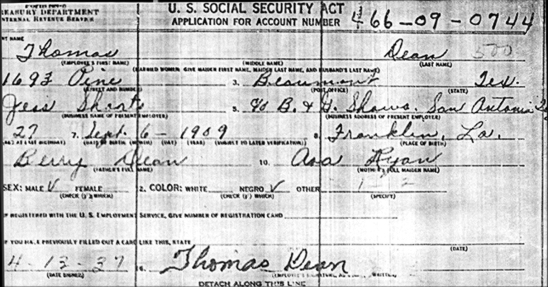
According to his great-grandaughter Tammy Dean (email communication, December 1, 2005), Tommy Dean married Annette Duhon (probably born in 1913) before he was out of his teens; their daughter Elizabeth Dean was born in the Prien Lake section of Lake Charles on January 7, 1928.
Dean's bio, as circulated by Vee-Jay when he was under contract to that label, states that he got his early experience as a performer in carnivals and circuses. His application for a Social Security card, filled out on April 13, 1937, lends support: his employer at the time was Jess Short, c/o B. and G. Shows, San Antonio, Texas.
The Vee-Jay bio states that while playing an outdoor road show in Saint Louis, Missouri, Dean came to the attention of bandleader Eddie Randle, who hired him as a sideman for his band, the Seven Blue Devils. At some point in the late 1930s (the bio says 1937, but Dean was still based in Beaumont during the first half of that year), Tommy Dean assembled his own combo and played throughout the Midwest, sometimes ranging farther afield. During this period we may assume that his style gradually made the transition from Swing to jump band music, and thence to rhythm and blues.
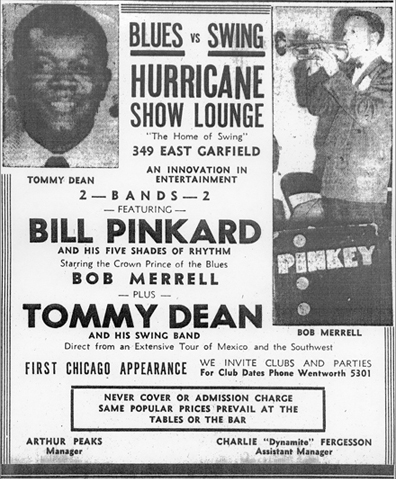
Though already a veteran musician, Tommy Dean did not become a factor on the Chicago scene until 1945. Under the banner "Tommy Dean and His St. Louisans," he began playing such clubs as the Hurricane Show Lounge (349 East Garfield) and Blue Heaven Theatre Lounge (742 East 63rd). His first appearance in Chicago was at the Hurricane. The ad in the Chicago Defender for January 20, 1945 reads, "Opens Thurs., Jan. 25th, First Chicago Appearance, Direct from an Extensive Tour of Mexico and Southwest, Tommy Dean and His Hot Swing Band." (His 2 week contract with options was accepted and filed by Musicians Union Local 208 on February 1. He filed another contract for 4 weeks on June 21, 1945.)
Dean did not appear in the South Side clubs during 1946, but his combo was back the next year. On April 17, 1947, he posted a 4-week contract with the Music Box Lounge. This was followed (on May 1) with a contract for 2 weeks plus options at the Hurricane. On May 3, 1947, the Defender carried a photo of Dean's quartet: "Tommy Dean, and his famed combo headline the attraction at the Hurricane Lounge." The ad in the same issue read, "Tommy Dean & His St. Louisans, direct from the Music Box Lounge," and promised an opening on May 6. The combo moved on to the Blue Heaven Lounge ("indefinite" contract accepted and filed on June 5).
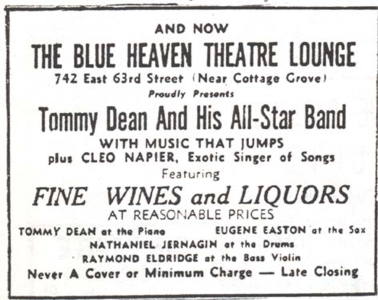
Around this time, Tommy Dean cut his first record, for the St. Louis-based label Town & Country. His band at the time included upcoming saxophonists Gene Easton and Chris Woods.
Christopher Columbus Woods was born in Memphis, Tennessee, on December 25, 1925. He began playing professionally there, but moved to St. Louis around the end of World War II. He worked with two mainstays of the St. Louis scene, the Jeter-Pillars Orchestra and the Swing band led by trumpeter George Hudson, before joining Tommy Dean's combo. His main ax was the alto saxophone but Dean chose to feature him on clarinet on the Town & Country session; his alto sax would be heard later, on the Miracle and States sides.
Many thanks to Tom Kelly for bringing the Town & Country session to our attention; it had never been listed in a discography before.

Tommy Dean (p); Gene Easton (as); Chris Woods (cl); James Taylor (ts); Buck Underwood (b); Nathaniel "Pee Wee" Jernigan (d).
Saint Louis, late 1947
| TC 800 A | Just before Day (Dean) | Town & Country 800-A | |
| TC 800 B | Rock Easy (Dean) | Town & Country 800-B |
Town & Country was a Saint Louis label. The company made some private pressings, plus a few commercial recordings of pop, country, gospel, and other forms of music. According to jazz violin expert Anthony Barnett, the label's other known venture into jazz was a 78 by Stuff Smith's quartet, recorded in December 1946 with Charles Fox (piano), Wendell Marshall (bass), and Bill Jennings (drums).
An ad in Billboard, October 23, 1948, from the St. Louis distributor, Roberts Record Dist. Co., lists three Town and Country releases in the 500 pop series: 501, 506, and 516. Bob McGrath's R&B Indies lists Town & Country 513 and a gospel release on Town and Country 1000. It would appear that Town & Country was busy recording in the second half of 1947 and the release schedule for these items extended into 1948; the company remained in business until 1952, according to McGrath.
All of our information about Town & Country 800 comes from Tom Kelly; the musicians are listed on the label. "Just before Day" would be recorded again, at Tommy Dean's first session for Vee-Jay in December 1954.
On September 26, 1947, tragedy struck the Dean family; Elizabeth Dean died of an asthma attack at the age of 19, leaving three young sons: Robert George and Richard George (from a short-lived marriage to Vorice George) and Ivy Lee Dean (born October 30, 1946). All three grandchildren were brought up by Annette Duhon, who was apparently separated from Tommy Dean by this time.
In December 1947, Harry Webber's "St. Louis Nights" column in the Pittsburgh Courier carried the following item:
Melvin Matthews, better known as "Pee Wee," boss of the blues, did some fine numbers Wednesday night with Tommy Deans [sic] Combo at the Glass Bar (December 6, 1947, p. 12)
The same column mentioned Freddie Blott serving as MC at the Rendezvous. We will encounter both of these performers again.
On February 21, 1948, the Defender ran an ad for the Blue Heaven Theatre Lounge, 742 East 63rd Street. The star attraction was "Tommy Dean and his St. Louisians, featuring Pee Wee (The Little Man with the Big Voice)." A follow-up ad on March 6, 1948, declared, "Brought back by Popular Demand: Tommy Dean and his St. Louisians, Music That Jumps—featuring Pee Wee (The Little Man with the little drum)." Obviously Nathaniel "Pee Wee" Jernigan was considered a draw in his own right. (A Tommy Dean contract, for 4 weeks at the Blue Heaven, was finally posted with Local 208 on June 17.)
Although we don't know of any gigs in Chicago in 1949, that was the year that Tommy Dean signed with Lee Egalnick and Lew Simpkins' Miracle label. Billboard announced on April 30 that "Miracle has inked Connie [sic!] Dean's ork to a pact at the suggestion of Spider Burke, St. Louis Negro d. j." (p. 42). Besides the drummer and part-time singer, the St. Louisians now included Edgar Hayes on tenor saxophone. Chris Woods had moved to the Bird-influenced alto sax on which he would excel for the rest of his career, and Gene Easton had switched to baritone sax. (We do not know whether Gene Easton, who played mostly tenor sax in his later years, was related to the better known baritonist McKinley "Mac" Easton. Gene Easton was born in Missouri, most likely in St. Louis, and was 13 years younger than Mac.)
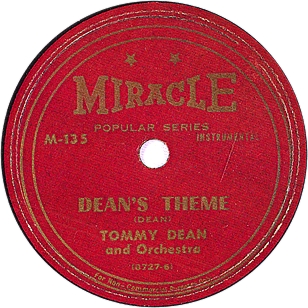
The off-series matrix numbers on Miracle 135 (none are listed in Jepsen, or in discographies that derive from it, such as Lord) tell us that 135 was not originally recorded for Miracle. The two sides could have been cut for Town and Country or some other outfit in Saint Louis. The numbers do not come from any studio series that is familiar to us.
Chris Woods (as); Edgar Hayes (ts); Gene Easton (bars); Tommy Dean (p); unidentified (b); Nathaniel "Pee Wee" Jernigan (d); Melvin "Pee Wee" Matthews (voc -1).
prob. Saint Louis, c. April 1949
| 8727-5 | Jump for Joy (Dean) [PWM voc] -1 | Miracle 135 | |
| 8727-6 | Dean's Theme (Dean) | Miracle 135 |
The likely recording date for these two sides is shortly before Dean's signing was announced in Billboard.
On the label of Miracle 135, the vocalist on "Jump for Joy" is identified as Pee-Wee Mathews [sic]. Melvin Matthews was a blues singer who made some guest appearances with the Dean combo (see above). It must have been confusing having two Pee Wees in the group, even for a short while.
Miracle 135 was released in July 1949. The company may have intended an earlier release, but at this point in its history the schedules were starting to slip.
"Jump for Joy" has a tenor solo by Edgar Hayes and two strong alto solos by Chris Woods. "Dean's Theme" is all ensemble, except for a brief tag by the alto sax.
The absence of Federal reissues for Miracle 135 could be due to an oversight. It could also be that Dean owned the masters and got them back after Miracle went out of business.
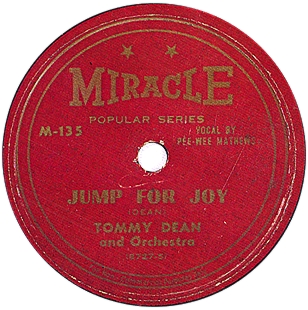
Egalnick and Simpkins went ahead with a Chicago recording session for Dean, at United Broadcasting Studio during July or August 1949. The four titles that were cut filled out Dean's two remaining releases on Miracle.
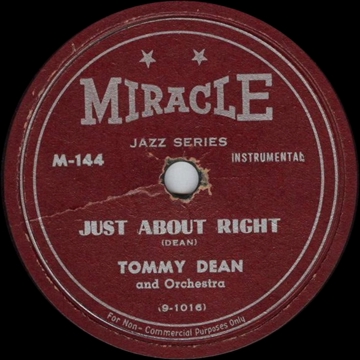
Chris Woods (as); Edgar Hayes (ts); Gene Easton (bars); Tommy Dean (p); unidentified (b); Nathaniel "Pee Wee" Jernigan (d, voc).
United Broadcasting Studio, Chicago, July or August 1949
| UB9-1014[tk. 1] [F-1032] |
Hour Past Midnight [Sweet and Lovely [sic]*] |
Miracle 157, Federal 12019-A*, Federal 12031-A, Official 6038 | ||
| UB9-1014 [tk. 2] | Hour Past Midnight | unissued | 7 or 8/49 | |
| UB9-1015 [tk. 1] | Scammon Boogie | unissued | ||
| UB9-1015[tk. 2?] [F-1033] |
Scammon Boogie | Miracle 157, Federal 12019-AA, Official 6038 | ||
| UB9-1016 [tk. 2] [F-1042] |
Just about Right | Miracle 144, Federal 12031-AA, Official 6038 | ||
| UB9-1017 [tk. 1 - fs] | Sweet and Lovely | unissued | ||
| UB9-1011[sic] UB9-1017 [tk. 2] [F-1043] |
Sweet and Lovely [PWJ voc] | Miracle 144, Official 6038 |
Our basic session information comes from Tom Lord's Jazz Discography. Lord supplies 1949 as the date; Bruyninckx says 1947. Leadbitter and Slaven have told us that UB9-1032 and 1033 were recorded on August 26, 1949 (they were from a St. Louis Jimmy session for JOB, most of it later sold to Apollo), so we can get more precise.

There are complete alternate takes of three of the Dean sides that were freshly recorded for Miracle. "Sweet and Lovely," featuring an outstanding introduction by Chris Woods and a decent ballad vocal by Jernigan, was finished in one take, after a false start.
Miracle 144 and 157 were 78-rpm singles. 144 was released in October 1949 and 157, which was the last Miracle, at some point in the first half of 1950.
Federal 12019 and 12031 were singles issued in 1951, after Miracle went bankrupt and King acquired some of its remains; new F series matrix numbers were affixed to the Federal issues. There is a major screwup on Federal 12031: the A side claims to be "Sweet and Lovely" and sports the appropriate matrix number, but actually plays "Hour Past Midnight."
Official 6038 was a French LP, entirely Tommy Dean material, released in the 1970s or 1980s. The title was Deanie Boy Plays Hot Rhythm and Blues. Thanks to Dieter Hartmann for correcting our information about this release, and for additional information about Miracle 135, 144, and 157. Hartmann says that his "advance copy" of Miracle 144 gives the matrix number for "Sweet and Lovely" as UB9-1011 (we strongly suspect that this was a misprint for UB9-1017).
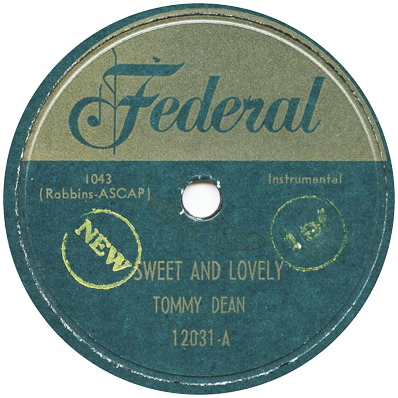
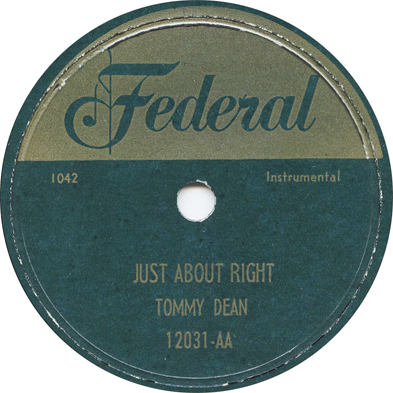
"Sweet and Lovely" features an impressive alto sax statement from Chris Woods, going from ballad to Bird flight in 32 bars.
Dean's personnel remained stable for the next three years. At some point during this period Gene Easton settled in Chicago, where he would spend the rest of his career.
In a letter to Goldmine magazine on April 20, 1999, Virgil G. Matheus reminisced about the St. Louis scene in those days:
My brother Ollie and I promoted dances in the late 1940s and the early 1950s. We introduced many of these groups to white kids in St. Louis. We kind of competed. He had Jimmy Forrest and Tab Smith while I had Tommy Dean and Chris Woods.
When Jimmy's "Night Train," Tab's "Because of You," Chris's "Brazil," all on United, hit St. Louis it was standing room only. Barely enough room for the jitterbugs.


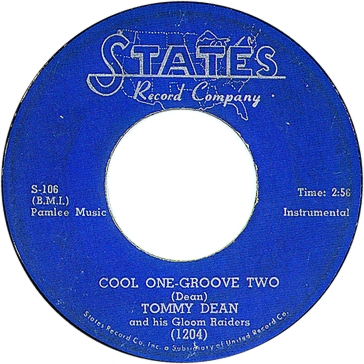
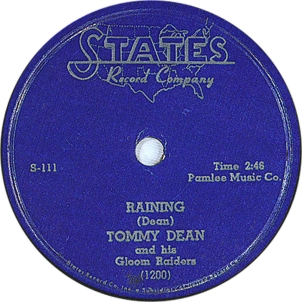
Chris Woods (as); Edgar Hayes (ts); Gene Easton (bars); Tommy Dean (p); Eugene Thomas (b); Nathaniel "Pee Wee" Jernigan (d, voc); Jewel Belle (voc)
Universal Recording, Chicago, June 4, 1952
| 1200-15 (1200-2 on original release) |
Raining (Dean) [PWJ, ens voc] | States 111, Delmark DL-434 | |
| 1201 | Just Right | unissued | |
| 1202-2 | Lonely Monday (Dean) [JB voc] | States 106, Official 6038, United U-114 [CD] | |
| 1202-8 | Lonely Monday (Dean) [JB voc] | Delmark DL-434, Delmark DE-554 [CD] | |
| 1203-1 | Foolish (Dean) [JB voc] | Delmark DL-434 | |
| 1203-4 (1203 on original release) |
Foolish (Dean) [JB voc] | States 111, Delmark DE-554 [CD] | |
| 1204-4 | Cool One-Groove Two (Dean) | States 106, Official 6038, Delmark DL-434, Delmark DL-438, Delmark DD-438 |
The group is called the Gloom Raiders in existing discographies, including Tom Lord's Jazz Discography, and on Official 6038. Most importantly, the combo is so identified on the labels to States 106 and 111. They appear as the Gloom "Chasers" in the notes to the Chris Woods LP on Delmark, which contains 4 tracks by the Tommy Dean group.
States 106 was released in August 1952; States 111 followed in December of that year. Jewel Belle is credited as "Vocal: Jewell Belle" on the label to "Foolish" (States 111). Our thanks to Daniel Gugolz for identifying take 2 of "Lonely Monday" as the version used on Official 6038 and United U-114 as well as on States 106. Take 8 was used on Delmark DL434 and DE-554.
Official 6038 was a French LP released in the 1970s or 1980s. Delmark DL434 was an LP released in 1976 as Chris Woods: Somebody Done Stole My Blues. Delmark DL-438 was a various artists collection from 1977 titled Honkers & Bar Walkers Volume 1; DD-438 is a CD with the same title and some items that Delmark acquired from the Regal label added; it was issued in 1992. United U-114 is a bootleg CD from 1997, titled Rare Windy City R&B: Early Vocal Groups Volume 3. It primarily consists of material by the Dozier Boys and the Four Blazes, plus one track each by Tommy Dean and Paul Bascomb. Delmark DE-554 is a CD from 2004 titled Yes Indeed! Women Vocalists on United; it includes contributions from most of the female vocalists who recorded for United, plus two who recorded for Regal.
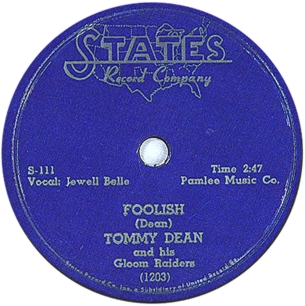
According to Bob Koester's United/States discography (Blues Unlimited, January /February 1977), "Rain" (as previous discographies call it) was remade at the end of the session, but the remake was not used. Koester gives the title as "It Rains"; however, his listing was made without consulting the labels on the original releases. Lacking confirmation of the surviving extra take, we have dropped the unnumbered "Rain" from this listing.
In Koester's 1977 discography, "Lonely Monday" and not "Foolish" is cited as the number that was issued in an alternate take on the Delmark LP. In fact, the LP did use another take of "Lonely Monday." But the liners state that 1203-1 was "a rejected take selected for superior solo work by Woods—Ms. Jewel Belle redeemed herself on the issued take 1203-4..." There were plans at the time to put the previously issued take of "Foolish" out on a Delmark anthology of St. Louis Modern Jazz of the 1950s, but this never materialized; it eventually made it onto DE-554. Meanwhile, "Cool One-Groove Two" is included on the Delmark Honkers & Bar Walkers anthology under Chris Woods' name—with the date of Tommy Dean's next session of November 19, 1952, and the personnel for Woods' date as a leader on February 24, 1953!

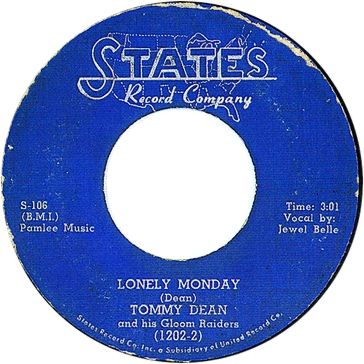
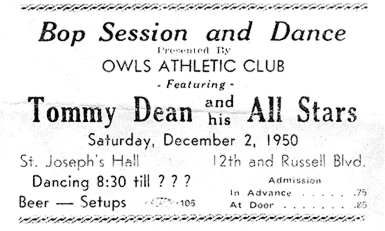
For some reason, Tommy Dean's second session for States has attracted no reissues. Michael Cuscuna's notes to Delmark DL-434 imply that material from this second session featuring Chris Woods was included in the LP, when in fact none was used. Meanwhile Delmark DL- and DD-438 incorrectly attach "Cool One-Groove Two" to this session when in fact it came from the preceding one. We wonder whether the tapes were labeled with the name of the vocal group that we can hear on the two released sides, and were consequently not recognized as Tommy Dean material.
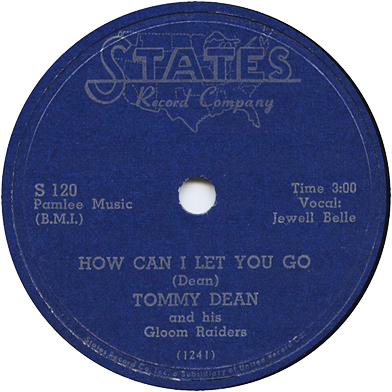
Chris Woods (as); Edgar Hayes (ts); Gene Easton (bars); Tommy Dean (p); Eugene Thomas (b); Nathaniel "Pee Wee" Jernigan (d, voc); prob. Jewell Belle (voc); unidentified male vocal group (voc).
Universal Recording, Chicago, November 19, 1952
| 1239 | If You Ever Change [JB voc?] | unissued | |
| 1240 | Scammon Boogie (Dean) [UVG voc] | States 120 | |
| 1241 | How Can I Let You Go (Dean) [PWJ, UVG voc] -1 | States 120 | |
| 1242 | I Lost My Man [JB voc?] | unissued |
Until recently, the only information on this sesson was what could be gleaned from Bob Koester's 1977 discography. States 120 was a 78 and 45-rpm single probably released in 1953. It's fairly rare; we finally got our hands on a copy in 2008. "How Can I Let You Go" was remade on Dean's first session for Vee-Jay (see the session of December 20, 1954), suggesting that neither the leader nor his record company were worried that the record-buying public would be sated with the song.
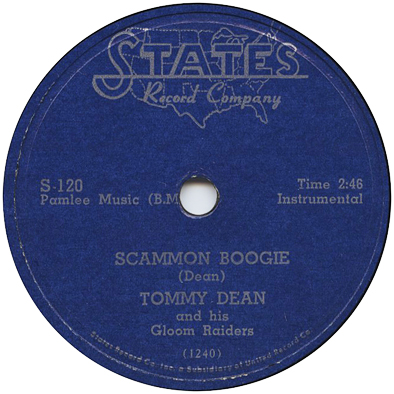
It turns out that on the two released sides, either Tommy Dean or Lew Simpkins had decided to experiment with a male vocal group (probably a quartet, but not identified on the label or anywhere else that we know of). On "How Can I Let You Go," Pee Wee Jernigan sings the lead and the vocal group is heavily featured. States incorrectly put Jewell Belle's name on the label and didn't mention the vocal group. Meanwhile, "Scammon Boogie" (a number that Dean had already cut for Miracle) was billed as an instrumental, but manages to work in two quick choruses by the vocal group (with nearly the same lyrics that Pee Wee Jernigan had sung on the earlier version). To complicate matters, the other male vocalists on "How Can I Let You Go" could be other members of the band (Gene Easton doesn't play his horn on the side, and Edgar Hayes is responsible for just a few notes on the tenor sax). But the group on "Scammon Boogie" sounds too polished, and as the group comes in all three saxes can still be heard.
We have a feeling that 1242, and maybe also 1239, had vocals by Jewel Belle, but without hearing them, we can't confirm this.
The band sounds like the one that made the first States session. Chris Woods is all over "How Can I Let You Go"; his alto sax is the only horn accompanying most of the vocals, and he takes a bluesy solo as well. "Scammon Boogie" features tight ensemble playing by the three saxes.
Not long after the second session for States, Dean's group broke up. Chris Woods had made a name for himself in Saint Louis and decided to go off on his own, taking the group's bassist and drummer with him. And Tommy Dean would never make another vocal group record.
Woods soon made his own session for United (matrix numbers 1276-1281); these tracks fill out the rest of Delmark DL-434. The liner notes incorrectly put it on the same date as the second Dean session; Koester's 1977 discography of the United and States labels places the Woods session on February 24, 1953. The lineup for Woods was Arthur "Pete" Redford (tb), David Wright (bars), Charles Fox (p), plus Eugene Thomas (b) and Pee Wee Jernigan (d) from the Dean group. (Our thanks to Yves François Smierciak for confirming the identity of the baritonist in Woods' group.)
"Brazil" from the Woods session must have sold in St. Louis, as it was featured in Woods' publicity for quite some time.

Tommy Dean had lost two key band members in Chris Woods and Pee Wee Jernigan. He bounced back with an entirely new lineup, which first appeared on an obscure session for the Chance label. Dean was not identified as the leader, most likely because he was still under contract to States.
The session was instead attributed to Barrel House Blott. Blott functions as both a coarse-voiced male comic monolog artist and a quality blues shouter on "Brand New Man." "Lee" is the more mellifluous female retorting to his bluster.
We still don't know a whole lot about Blott, but we've learned that he more often went as Freddie. According to a brief item rediscovered by Armin Büttner, he'd previously had a near-miss on recording for Aristocrat: "Freddie Blott, local blues and jump sensation, caught the eyes of talent scouts from Aristocrat Records when he was featured here this week at a concert given to determine the best combo in St. Louis" (Chicago Defender, "Aristocrat Inks Blott," December 3, 1949, p. 26). Blott was supposed to record with a band led by Ditty Bo Hill, but something must have fallen through. So far as we know, the session for Chance would be his first and only.
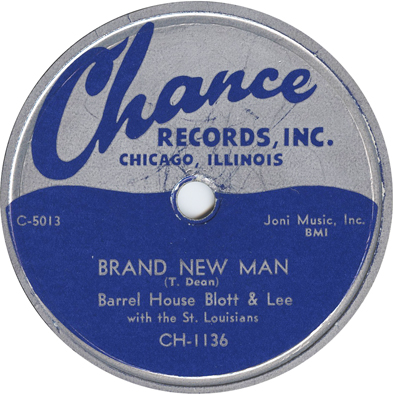
Freddie "Barrel House" Blott (voc); "Lee" (voc); prob. Cornelius "Chuck" Tillman (ts); Tommy Dean (p); prob. Archie Burnside (b); prob. Edgar Plaes (d).
Chicago, around March 1953
| C5012 | Brother Catch the First Train | unissued | |
| C-5013 | Brand New Man (T. Dean) [BB, L voc] | Chance 1136, Chicago CH-LP 213 | |
| C5014 | Hey Mathilda | unissued | |
| C-5015 | Chicks, Going Crazy (T. Dean) [BB, ens voc] | Chance 1136 |
The composer credits, the name of the group, and the sound of the band all tell us who was running the show. We identified the instrumentalists by ear.
Thanks to Dieter Hartmann and Dr. Robert Stallworth for information about Chance 1136, a 45 and 78-rpm single. We figure it was issued around June 1953. The single was not advertised in Billboard, but according to Bill Daniels, Chance 1132, 1134, and 1135 were mentioned in May 1953; 1138 showed up in June; and 1137, 1140, and 1141 were covered in July of that year. According to John Tefteller's auction of April 1999, some 45-rpm copies of Chance 1136 were pressed on red vinyl. "Brand New Man" was reissued on a white-label collectors' LP, Chicago CH-LP 213.
Archie Burnside, who probably started playing bass with the group on this session, had been around the Saint Louis scene for a while. On February 29, 1952, the St. Louis Post-Dispatch had his band starting the next Monday at the Top Hat Cocktail Lounge on Delmar.
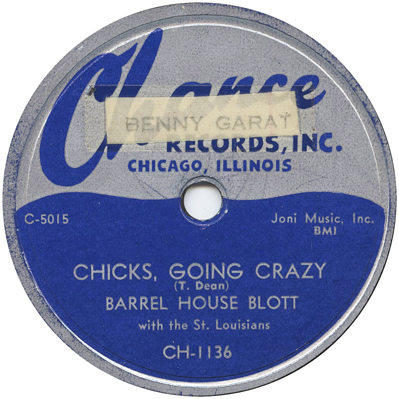
Like so many other Chance artists, Tommy Dean resurfaced with the new Vee-Jay label after Chance wound up its operations. Now he was working with an expanded (and better documented) lineup that featured singer Joe Buckner. Dean's new alto saxophonist, Oliver Nelson, was born in St. Louis on June 4, 1932. He had already been lead altoist for the Jeter-Pillars Orchestra and the George Hudson band as well as the Nat Towles band. He played in a Louis Jordan group before returning to St. Louis to study music theory and composition at Washington University.
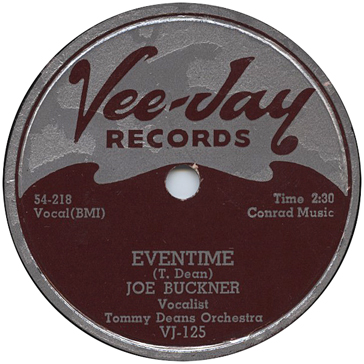
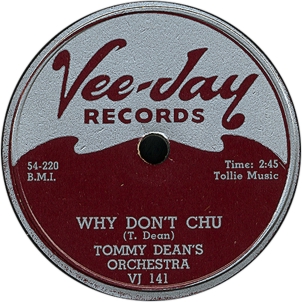
Tommy Dean (p -1, org -2); Oliver Nelson (as); Cornelius "Chuck" Tillman (ts); Archie Burnside (b); Edgar Plaes (d); Joe Buckner (voc).
Universal Recording, Chicago, December 20, 1954
| 54-216 | Deanie Boy [The Horse#] (Dean) -2 | Vee-Jay 125, Vee-Jay 339#, Oldies 45 OL92, Official 6038, Vee-Jay NVD2-716 [CD] | |
| 55-217 | Just before Day -1, 2 | Vee-Jay NVD2-716 [CD] | |
| 54-218 | Eventime (Dean)* [JB voc] -2 | Vee-Jay 125, Vee-Jay LP 1084, Official 6038, Oldies 45 OL89, P-Vine Special [J] 5271/4 [CD], Collectables CD 7204 | |
| 54-219 | How Can I Let You Go (Dean)% [JB voc] -2 | Vee-Jay 141, Official 6038, Collectables CD 7204 | |
| 54-220 | Why Don't Chu? (Dean)^ [ens voc] -1,2 | Vee-Jay 141, Official 6038, Collectables CD 7204 | |
| 55-221 | 221 Rock -1, 2 | Vee-Jay NVD2-716 [CD] |
Session information from Lord, except for the piano and organ credits, which were supplied by ear (Lord has Dean on piano only). Dean may have been playing the organ on his live gigs for a while, but this is his first recording session on the instrument. On his Vee-Jay outings, Dean would sometimes play piano with one hand and organ with the other; he can be heard doing so on "Why Don't Chu?" and "221 Rock." Lord claims that the 55 prefix was attached to these tracks, even though they were cut at the end of 1954. But every copy of Vee-Jay 125 we have seen shows the (correct) 54- prefix. Vee-Jay 141 also shows the 54's.
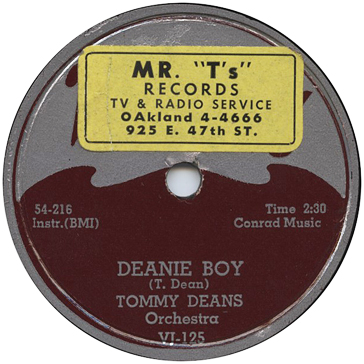
Vee-Jay 125 was released on 78 and 45 rpm in January 1955. It was part of a 5-release batch first advertised in Cash Box on January 22, 1955 (p. 29). As Vee-Jay 124 (by the Rhythm Aces) and Vee-Jay 125 outpaced Vee-Jay 120, 121, and 122 in sales, the company began advertising just 124 and 125; for instance, in Cash Box on February 12, 1955 (p. 35). Vee-Jay 125 was reviewed in Cash Box on February 5 (p. 28).
Vee-Jay 141, also 78 and 45 rpm, came out in June of that year; it was advertised in Cash Box on June 25, 1955 (p. 24) and again on July 9, 1955 (p. 27). Cash Box reviewed it on July 23 (p. 42).
Vee-Jay 339 was a 45-rpm single released in 1960. When "Eventime" was included on Vee-Jay LP 1084, the title came out as "Evenin' Time." (Our thanks to Big Joe Louis for extracting the information about the LP issue from the Vee-Jay Master Book.)
Oldies 45 OL89 was a 45-rpm reissue put out in January 1964. Vee-Jay operated Oldies 45 as a reissue label, putting out a raft of releases in 1963 and 1964, with the last few appearing in 1965. Most of the sides chosen for the Oldies treatment were from Vee-Jay, but the company also licensed old hits from other labels, remastering them and applying new matrix numbers in Vee-Jay's main series. On the B side of Oldies OL89 "Eventime" was correctly titled, but the artists were referred to as "Joe Buckner - Vocalist | Timmy Dean's Orchestra" (sic!). (We'd heard it was "Timmy Dan's" Orchestra, but the label wasn't that messed up.) The A side is "My True Love" by Jack Scott, with matrix number 64-3812, which pretty firmly dates the release.
Oldies 45 OL92, also from January 1964, includes "Deanie Boy," correctly titled and correctly attributed to Tommy Dean's Orchestra, as its B side. The A side, by Paul Evans, was originally made for another company in 1959 and carries the new master number 64-3817.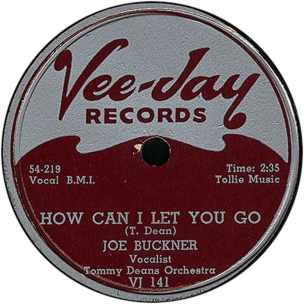
Vee-Jay NVD2-716, Sax Appeal, was a various-artists CD compilation of jazz and R&B with saxophone solos that the Vee-Jay Limited Partnership put out in 1993; it was produced by Billy Vera. "Just before Day" was released for the first time on this CD; some discographies, up through Lord, relied on a garbled transcription from the company files: "Just be-fo Joys." Leadbitter and Slaven, 1987, got the title right but gave the matrix as 54-217. They mentioned "221 Rock" and gave its matrix as 54-221. In 2000, "Eventime" was included on P-Vine Special 5271/4, a 4-CD box of Vee-Jay blues and R&B titled Vee-Jay, The Chicago Black Music. Collectables CD 7204, Vee-Jay Rhythm & Blues: The Early Years Part One, was released in 2000: it renders two of the titles as "Evenin' Time" and "Why Don't You."
A bio sheet from Vee-Jay (probably issued in January 1955, when they were promoting the first Dean release on the label) reads as follows:
Pianist Tommy Dean first gained attention in St. Louis, Missouri, as sideman with Eddie Randle and his Seven Blue Devils. The soft spoken, smiling keyboard artist is a producer from Beaumont, Texas, who got his early training and experience with carnivals and circus performances. While playing in St. Louis many years ago with an outdoor road show, the community hospitality and the warm and friendly reception of the Musicians Local were two reasons why Dean accepted bandleader Randle's offer. After gaining advance knowledge and experience of a batonist with Randle's aggregation, Tommy decided to go on his own around 1937 and has been very successful. The Dean crew seems to be a favorite in Arkansas, Tennessee, Iowa, Illinois, Indiana, and throughout Missouri.
"Deanie Boy" and "Evening Time," two of Tommy Dean's latest releases, are catching on like wildfire nationwide in the Rhythm and Blues field.
The "time tune" is a blues that spotlights the hidden talent of Joe Buckner, whose style of performance is St. Louis's current rage. Buckner has been singing the blues and beating at Boogie Woogie around St. Louis for a long time, but a "hit record" is one means of gaining nationwide attention sooner than expected, and it looks like he has one.
According to Eric LeBlanc, Joe Buckner was born in St. Louis on June 4, 1924. Buckner began playing and singing in church at age 9. Around 1949, he worked in St. Louis with drummer Joe Smith, whose band included Buckner (p, voc), Jimmy Forrest (ts), and Wendell Marshall (b). Smith worked at the Windmill Bar in St. Louis from 1949 through at least early 1953; according to items in Down Beat on October 28, 1952, December 3 of that same year, and March 25, 1953, he was by then leading a Dixieland ensemble called Joe Smith & his Rampart Street Ramblers. After the Smith gig, Buckner moved to a group led by Fred Lee (d) with Charles Lawrence (ts) and Lawrence ... (b). Buckner gave the dates to Otto Flückiger as "1950-1951." But he also recalled his service with Tommy Dean as lasting from 1951 to 1953, so these are undoubtedly too early. Buckner's remake of "How Can I Let You Go" reminds us that soul music was starting to emerge in 1954.

Vee-Jay obviously wanted more from Dean's combo. Not long after releasing Vee-Jay 125, the company set up another session, which turned out to be abortive, with just one usable side completed (one the company was in no hurry to release). Dean normally had two horns in his group; did the tenor saxophonist call in sick?
Tommy Dean (p); Oliver Nelson (as); Archie Burnside (b); Edgar Plaes (d).
Universal Recording, Chicago, February 17, 1955
| 55-243 | The Gold Coast (Dean) | Vee-Jay 218, Official 6038, Vee-Jay NVD2-716 [CD] |
Information from Lord. Lineup confirmed by ear. This session immediately followed 55-240, 241 and 242, by The Spaniels and The Dells with unidentified accompaniment. Vee-Jay 218 was reviewed in Billboard in December 1956. Vee-Jay NVD2-716 was a various-artists CD released in 1993 under the title Sax Appeal.

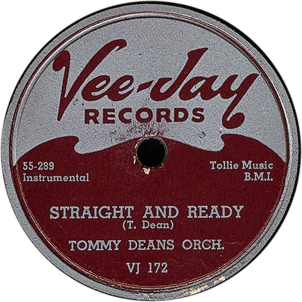
Tommy Dean (p-1; org -2); Cornelius "Chuck" Tillman (ts); Joe Whitefield (ts); Archie Burnside (b); Edgar Plaes (d); Joe Buckner (voc).
Universal Recording, Chicago, July 11, 1955
| 55-289 | Straight and Ready (Dean) -2 | Vee-Jay 172, Official 6038, Vee-Jay NVD2-716 [CD] | |
| 55-290 | Skid Row (Dean) ^ -1, 2 | Vee-Jay 218, Vee-Jay 339, Official 6038 | |
| 55-291 | One More Mile* (Dean) [JB voc] -1, 2 | Vee-Jay 172, Official 6038, P-Vine Special [J] 5271/4 [CD], Collectables CD 7270 | |
| 55-292 | Come Home Baby | unissued |
Our session information is drawn from Lord. On "Skid Row," Dean sometimes plays piano with one hand and organ with the other; on "One More Mile," he switches from one instrument to other.
Vee-Jay 172 was released in February 1956. It was first included in a Vee-Jay ad in Cash Box on February 4 (p. 32), then advertised on February 11 (p. 39), and February 25 (p. 34). It got a solo ad on March 3 (p. 28), and further pushes on March 24 (p. 32) and March 31 (p. 24).
Vee-Jay 218 was reviewed in Billboard in December 1956.
Vee-Jay NVD2-716 was a various-artists CD, released in 1993 under the title Sax Appeal. In 2000, "One More Mile" was also included on P-Vine Special 5271/4, a 4-CD box of Vee-Jay blues and R&B titled Vee-Jay, The Chicago Black Music, and on Collectables CD 7270, The Very Best of Blues Volume 2.
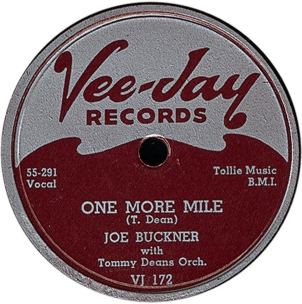
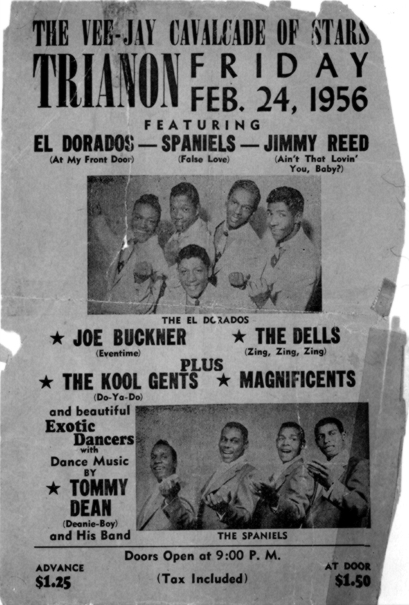
According to Cash Box (March 10, 1956, p. 29), the Spaniels joined their fellow Vee-Jay artists Jimmy Reed, The El Dorados, and "Joe Buckner and Tommy Dean's Ork" on February 24 at the Trianon Ballroom, 62nd and Cottage Grove. The "Vee-Jay Cavalcade of Stars" was next in Milwaukee (February 25), then in Dallas (the 27th), with further concerts scheduled in Tucson and Phoenix. By April the tour had reached Seattle.

On May 10, Tommy Dean and His V J Recording Rock 'n Roll Combo" were back in the area, opening at Sparwasser's on South Belt Line in Belleville (Saint Louis Post Dispatch, May 9, 1956, p. 9F). In June, Tommy Dean and his "All-Star Band" were at Wally Olsen's Follies, 1500 Tower Grove (Saint Louis Post-Dispatch, June 8, 1956, p. 7D). Chuck Tillman got his own billing and they were said to be "Direct From Coast to Coast Rock 'n' Roll Tour."
Except for Joe Buckner, Dean's last two sessions for Vee-Jay again feature a new group. Buckner recalled touring with the groups that included Oliver Nelson, Chuck Tillman, and Archie Burnside. He did not recall this group, which perhaps signifies that it was not a working band. More likely Chuck Tillman had left Dean to form his own band (Tillman was leading one toward the end of the decade.) Oddly, none of these sides were released at the time and all but two remain on the shelf today, even though the 1956 session appears to have been Grant Green's recording debut. Apparently Vee-Jay lost all interest in Dean after releasing Vee-Jay 218 in December 1956.
Tommy Dean (org); Fred Lee (ts); Grant Green (eg); Hattuch Alexander (b); Milton Wilson (d, bgo); Joe Buckner (voc).
Universal Recording, Chicago, October 23, 1956
| 56-562 | Boogie Googie (part 1) | Vee-Jay (unissued) | |
| 56-563 | Boogie Googie (part 2) | unissued | |
| 56-564 | Ain't No Justice | unissued | |
| 56-565 | She Left Me Alone | unissued | |
| 56-566 | Come On | unissued |
Our information about all items is from Lord. Grant Green, we might note, is said in other sources to have made his recording debut in 1959! If only because Green went on to greater fame, it is surprising that no attempt has been made to issue this material.
On New Year's Eve, Tommy Dean and His Combo were on the bill for a 4 hour Rock and Roll stage show at the Lyn Theatre in Saint Louis. Dean's band and Ike Turner's backed "8 Great Rockin' Acts" (Saint Louis Post-Dispatch, December 30, 1956, p. 4G). For a night, Tommy Dean was once again "The Gonest." In February, Dean's combo was playing Peacock Alley in the Midland Hotel on Thursday, Friday, and Saturday nights. Peacock Alley was a jazz venue (Saint Louis Post-Dispatch, February 6, 1957, p. 6D).
Tommy Dean (org); Charles Williams (as); Fred Lee (ts); Lefty Bates (eg); Hattuch Alexander (b); Don Porter (d); Milton Wilson (bgo, perc); Joe Buckner (voc).
Universal Recording, Chicago, May 27, 1958
| 58-916 | Odds and Ends | Vee-Jay (unissued) | |
| 58-917 | Recession ^ | Vee-Jay NVD2-718 [CD], P-Vine Special [J] 5271/4 [CD], Collectables CD 7269 | |
| 58-918 | Diana | unissued | |
| 58-919 | Christopher Columbus | unissued |
Our session information comes from Lord, who gives "58-518" and "58-519" as the last two matrix numbers; these are obviously misprints. Lord indicates his substitutions ambiguously; it could be that both Don Porter and Milton Wilson were present, or that Wilson was there by himself. On "Recession" only the trap drums can be heard. (The 1958-1959 recession was the subject of several topical blues, including one by L. C. Cohen that is included on our Claude McLin page.) Joe Buckner sings, "They're calling it a recession / But it looks like a depression to me." The references in lyrics to the PWA, WPA, and the AAA are derived from the leader's experiences back in the 1930s.
"Recession" was issued for the first time in 1993 on Vee-Jay NVD2-718, A Taste of the Blues, Vol. Two, a reissue compiled by Billy Vera. In 2000, the track was also included on P-Vine Special 5271/4, a 4-CD box of Vee-Jay blues and R&B titled Vee-Jay, The Chicago Black Music as well as Collectables CD 7269 The Very Best of Blues Volume 1.
After his last recording session in 1958, Tommy Dean continued to tour with his combo. In December 1960, his quartet ("Direct from Las Vegas") did a week at La Gigi Room, 5611 Delmar (Saint Louis Post-Dispatch, December 2, 1960, p. 5F). By 1962, he had to downsize; the last few advertisements we have found are for solo appearances. In October 1962, he was playing the organ the Silver Dollar, 4324 Gaslight Square, in loose association with horn player Johnny Wattles and drummer Chic Booth (Saint Louis Post-Dispatch, October 7, 1962, p. 8E).
According to Gloria Williams (in an email of January 4, 2004), Tommy Dean was married to her cousin Rushelle and they continued to make St. Louis their home. In June 1964, Dean was appearing as a single at Gino's (the former Gigi Room), 5611 Delmar, a club billed as the "House of Jazz" (Saint Louis Post-Dispatch, June 5, 1964, p. 4D). In October "Tommy Dean & His Organ" were featured "for your entertainment daily" at Mr. M Restaurant and Cocktail Lounge, 3425 North Lindbergh Boulvevard; a Saturday night sing along included Dean at the piano bar as well as the organ (Saint Louis Post-Dispatch, October 1, 1964, p. 5N).
In January 1965, Tommy Dean died suddenly—perhaps from a heart attack. (Early 1963 was Gloria Williams' recollection, but see above for gigs from 1964; the Social Security records put his date of death as January 1965.) His second wife Rushelle Dean survived him; they had no children. Rushelle Dean is now also deceased.
According to Tammy Dean (email communication, December 1, 2005), Tommy Dean's first wife Annette was still alive in 2005 at the age of 91. His living descendants are his grandson Ivy Lee Dean, his great-grandchildren Tammy Dean (born May 1965) and Tommy Dean (born April 1968), and his great-great grandson (also named Tommy Dean).
Oliver Nelson went on to a prominent, well-recorded career as a saxophonist, composer, and arranger. He died on October 27, 1975, in Los Angeles.
After initial success as a bandleader in St. Louis, Chris Woods endured some lean years in the late 1950s, when he had to rely on day jobs. He moved to New York in 1962, finding work with Dizzy Gillespie, Clark Terry, and Sy Oliver, among others. During his later period he played baritone sax and flute regularly as well as alto sax. In the 1970s he recorded with Ted Curson and Clark Terry, and made three albums as a leader. In 1983 Woods became a member of the last Count Basie Orchestra. He died in New York City on July 4, 1985.
Chuck Tillman led his own bands in St. Louis for a few years. In 1959, the Tillman combo backed R&B vocalist Herman McFadden on a single recorded in St. Louis for the Cawthron label. Tillman played tenor sax on "Gal Crazy" (Cawthron 505-B) and flute on "The Girl I Love" (505-A).
Joe Buckner was out of music for a while after the last Tommy Dean session, playing professional baseball and working on and off for the Post Office. Around 1960-1961, he led a band in St. Louis consisting of himself on piano and vocals, Fred Lee (who had played tenor sax on Tommy Dean's last two sessions), Buck Underwood (who had played bass on Tommy Dean's first session), and Virgil Watson (drums).
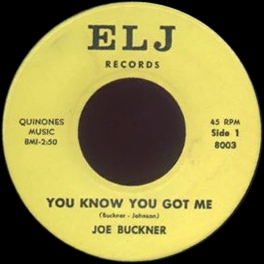
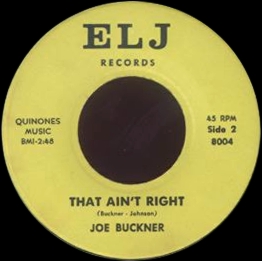
Joe Buckner recorded four sides with his trio (himself on piano and vocals, Pete Anderson on bass, and Fred Lee on drums; Leroy Harris made a guest appearance on sax). "You Know You Got Me" b/w "That Ain't Right" came out on ELJ 8003/8004 under Joe Buckner's name; they were followed by "Soul for Sophia" b/w "Come Home Baby" on ELJ 8011/8012 (Harris is not present on the second release, and "Soul" is an instrumental). The label was co-owned by Joe Buckner, Leroy Harris, and Eddie Johnson, the former pianist and Swing band leader who had made one record of his own back in 1932; Johnson shared the composer credit for all of the abovementioned sides. We are indebted to Kevin Belford for confirming the existence of these Joe Buckner sides. Belford also mentioned Leroy Harris's presence. Buckner's recollections to Flückiger seemed to place the ELJ sides in the early 1950s, before the singer joined Tommy Dean. But shortly after the second Joe Buckner single, ELJ released Tab Smith's last recording, ELJ 8013/8014. In all the label released 3 singles by Tab Smith, which postdated his brief tenure at King Records in 1960.
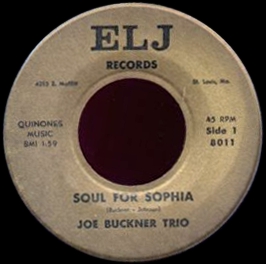
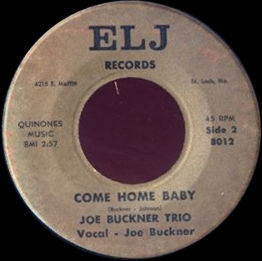
Many years later, a performance at Hannegan's in St. Louis, featuring Joe Buckner's Quartet (Buckner, piano, vocals; Charlie Wright, tenor sax; Otis Little, bass; Benjamin Harris, drums) with singer Elaine Donahue and Dave Harris guesting on tenor sax, was recorded on May 3, 1980. 14 tunes from a private cassette recording are now in the Otto Flückiger archives.
Gene Easton died in Chicago in July 1998, after being struck by a car. He was 71 years old.
Our thanks go to Tom Kelly, Leonard J. Bukowski, Dieter Hartmann, Virgil Matheus, Allan Moss, and Kevin Belford for help with this page; to Bill Daniels for information about Chance release dates; to Billy Vera for Vee-Jay label shots and the Tommy Dean publicity photo; to Otto Flückiger for his files on Tommy Dean and Joe Buckner; and to Gloria Williams, Eric Leblanc, and Tammy Dean for helping us to uncover basic biographical information on a terribly underdocumented musician.
Click here to return to Red Saunders Research Foundation page.